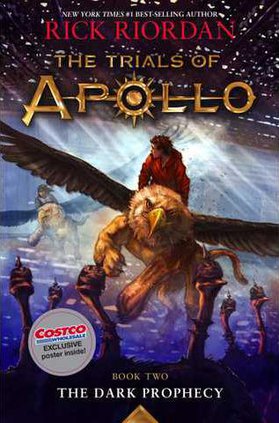Best-selling author Rick Riordan recently told Entertainment Weekly that his latest book The Burning Maze from the Apollo series will have many connections to his past works.
Riordan opened up about his latest book, which is the third in the new Trials of Apollo series, to Entertainment Weekly this week.
Riordan, who penned the Percy Jackson & the Olympians series, often tells stories of ancient Greek gods living in modern America. But for his latest series, Riordan put the focus on Apollo, an actual Greek god.
And the latest book in the series will include callbacks to previous books.
For example, for his newest book, Riordan said he brought back a specific setting, the Labyrinth, seen in The Battle of the Labyrinth, which was the fourth novel in the Percy Jackson & the Olympians series.
The Labyrinth weaves itself under the skin of the world, Riordan told EW. It can take you anywhere, assuming you dont get lost or killed by monsters or traps. Its one of my favorite extrapolated ideas from Greek mythology, so I couldnt resist bringing it back in 'The Burning Maze.' I just love the idea of a secret, unpredictable underworld that you might fall into at any minute. In this book, I think its not much of a spoiler to say that things in the Labyrinth are heating up.
Riordan confirmed that the new series will see many characters and locations from the Percy Jackson and Heroes of Olympus series.
By the time The Trials of Apollo series is over, we will have gone to a lot of new places and met a lot of cool new characters, but well also have seen just about everyone we cared about from Percy Jackson and The Heroes of Olympus, he said.
You can read the first chapter of the book and review the cover at Entertainment Weekly.
The book hits shelves everywhere on May 1.
Riordan announced a list of new books for 2018, too. His list of books of the year includes The Magnus Chase Coloring Book and The Lightning Thief Illustrated Edition later this year.
Riordan opened up about his latest book, which is the third in the new Trials of Apollo series, to Entertainment Weekly this week.
Riordan, who penned the Percy Jackson & the Olympians series, often tells stories of ancient Greek gods living in modern America. But for his latest series, Riordan put the focus on Apollo, an actual Greek god.
And the latest book in the series will include callbacks to previous books.
For example, for his newest book, Riordan said he brought back a specific setting, the Labyrinth, seen in The Battle of the Labyrinth, which was the fourth novel in the Percy Jackson & the Olympians series.
The Labyrinth weaves itself under the skin of the world, Riordan told EW. It can take you anywhere, assuming you dont get lost or killed by monsters or traps. Its one of my favorite extrapolated ideas from Greek mythology, so I couldnt resist bringing it back in 'The Burning Maze.' I just love the idea of a secret, unpredictable underworld that you might fall into at any minute. In this book, I think its not much of a spoiler to say that things in the Labyrinth are heating up.
Riordan confirmed that the new series will see many characters and locations from the Percy Jackson and Heroes of Olympus series.
By the time The Trials of Apollo series is over, we will have gone to a lot of new places and met a lot of cool new characters, but well also have seen just about everyone we cared about from Percy Jackson and The Heroes of Olympus, he said.
You can read the first chapter of the book and review the cover at Entertainment Weekly.
The book hits shelves everywhere on May 1.
Riordan announced a list of new books for 2018, too. His list of books of the year includes The Magnus Chase Coloring Book and The Lightning Thief Illustrated Edition later this year.








